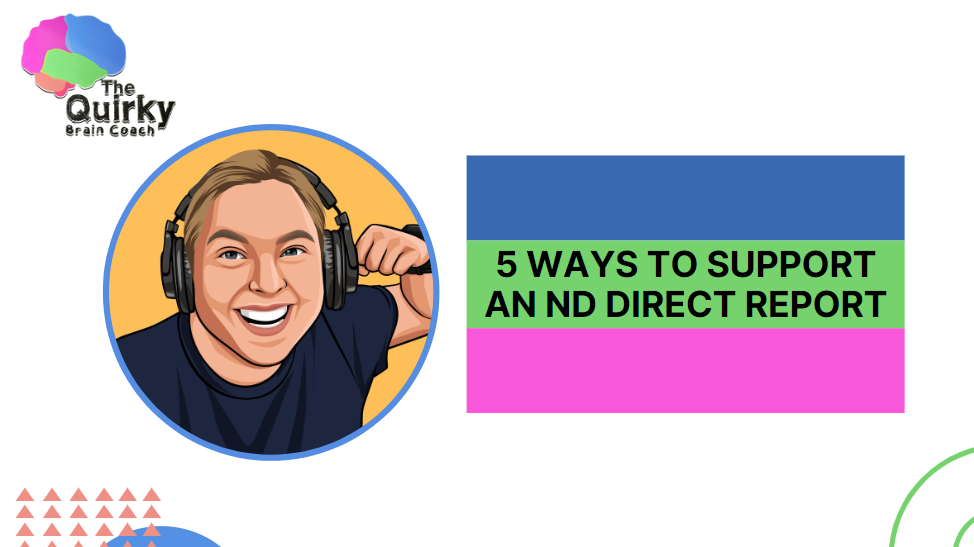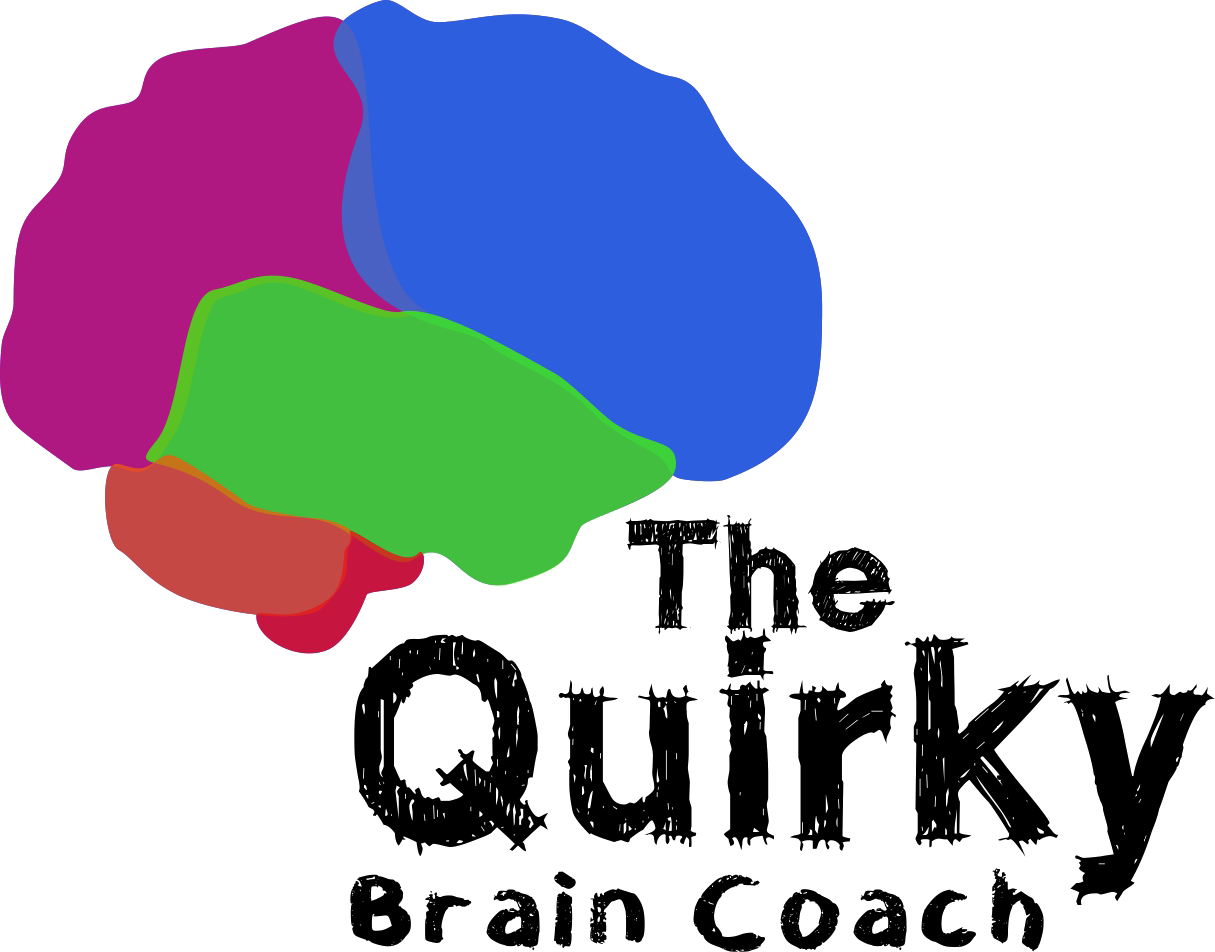
I work with many managers in sales organisations, law firms and the NHS about how to support their direct reports through effective performance management and coaching.
In my conversations with line managers, it becomes clear that line managers often have a clear intention to support neurodivergent direct reports to succeed and feel well in the workplace, but there are some gaps in knowledge for how to go about this.
In this post, I lay out 5 things you can consider as a line manager of a neurodivergent person in order to create a cultural and performance-management environment that can meet their needs as a neurodivergent person.
Below is the list…and then below that, I’ll unpack what you can consider in more detail.
- Ask them what they want and need
- Talk to HR or occupational health
- Encourage them to apply for Access to Work (if they feel it would help)
- Provide neuro-inclusive feedback
- Offer neuro-affirmative and neuro-inclusive workplace coaching
1 Ask them what they want and need
Many neurodivergent people report having times in their life where they had little autonomy or agency. Decisions will have been made for them or they will have had to make inauthentic decisions out of a desire to try to fit in. This is exhausting, and wears down confidence and belief in the self for many.
You as a line manager can help to stop this from happening in future, which can help in reducing the likelihood of poor mental wellbeing and burnout linked to the workplace.
When a direct report discloses that they are neurodivergent, one of the things you can simply do is ask them what they want and need. Ask them how they would like this to be handled? Ask them what narrative they do or don’t want to share with other people. Ask them what support or adjustments would help them (and if they do not know, as some will not, let them know they can speak to HR or occupational health to discover what supports could be of use to them).
The main thing is to take a lead from the neurodivergent direct report on what happens next, and empower them to be involved in decisions about how to help them in the workplace.
2 Talk to HR or occupational health
Regardless of whether the direct report would like to seek help from HR or occupational health, it may be that you also have a need from these teams.
It is common enough that people enter leadership and management roles without sufficient training on how to offer performance management or supportive, encouraging management. However, it is even more common that no one receives specific guidance and training on how to line manage or coach neurodivergent direct reports in a safe, effective and inclusive manner.
If you feel like you do not know how you could help or you require some advice or training on working with neurodivergent team members supportively, then you can ask HR or occupational health for some advice. You can also look at your own training budget and self-development budget for the year to see if there is any training you can undertake.
3 Encourage them to apply for Access to Work (if they feel it would help)
The government runs a programme called Access to Work which exists to provide practical support and support services at no cost to the individual to help them function and feel well in the workplace.
Your direct report – if they want it – could be awarded supports such as software, computer equipment, apps, mental health support and workplace coaching. This is paid for in part by the government and by the organisation.
If your neurodivergent direct report would like to access this funded support, then the initial application can be done online here and it takes 10-15 minutes to get the ball rolling.
After 3-5 months (from my experience) this support is in place and the person can have more of what they need to carry out their role well, and feeling good about it too. If your direct report indicates they would like a specialist coach, I do this work, so please invite them to consult with me to see if we would be a good fit for one another.
However, the main thing is to give them choice around if/how they use Access to Work, as autonomy and choice are empowering here.
4 Provide neuro-inclusive feedback
Feedback that is supportive, impactful, fair and encouraging is hard enough to give at times.
In addition to this, it is important that your feedback conversations are neuro-inclusive when supporting the range of brains in your team.
Neuro-inclusive feedback is feedback that is
- Presented in a way that is fair and objective (using a model helps)
- Given in a way such that aspects of disability or a neurodivergent condition are not highlighted as failures or impossible development points (imagine that this is like telling someone who needs glasses to just try harder to see better!)
- Given in such a way that it’s understandable, process-able and clear given the brain needs of the person you’re feeding back to
- Looks for ways forward that are autonomously chosen by your team member and which are wanted, doable, realistic and supported by the organisation
- Positive towards different brains and different ways of thinking and communicating
- Is trauma-informed or takes account of neurodivergent people who experience rejection sensitivity, for example
The list above will help you to reflect on if and how you could craft your feedback conversations to meet the needs of a neurodivergent direct report.
However, you may decide that you require some training on how to do this, with real examples and a chance to apply the learning to real-life management scenarios. Ask your own line manager to organise such training for you.
5 Offer neuro-inclusive and neuro-affirmative workplace coaching
Having an effective and inclusive culture of coaching is a benefit to many commercial organisations.
Coaching brings commercial benefits, supports change management, drives productivity, supports workplace wellbeing and saves time and resources for managers who otherwise lose time on micro-managing people.
What I find is that organisations do coach, but they often don’t go as far as considering whether their coaching is neuro-inclusive (see above) or neuro-affirmative, i.e. taking the view that all kinds of brains are welcome and valid.
My early research is showing that specific adjustments to coaching can be needed to support the buy-in, willingness to engage with coaching, and the learning and growth of neurodivergent employees in an effective but accessible way.
If you do not know how to plan, execute and follow up on a coaching session that meets the needs of your neurodivergent direct reports, this is something I can help with. Ask me how I can help.
There you have it: 5 things to consider to better support neurodivergent direct reports in your support of them.
If you have any questions, reach out to me for insight and to arrange a discovery call.
All best wishes and thanks for reading,
Becci
